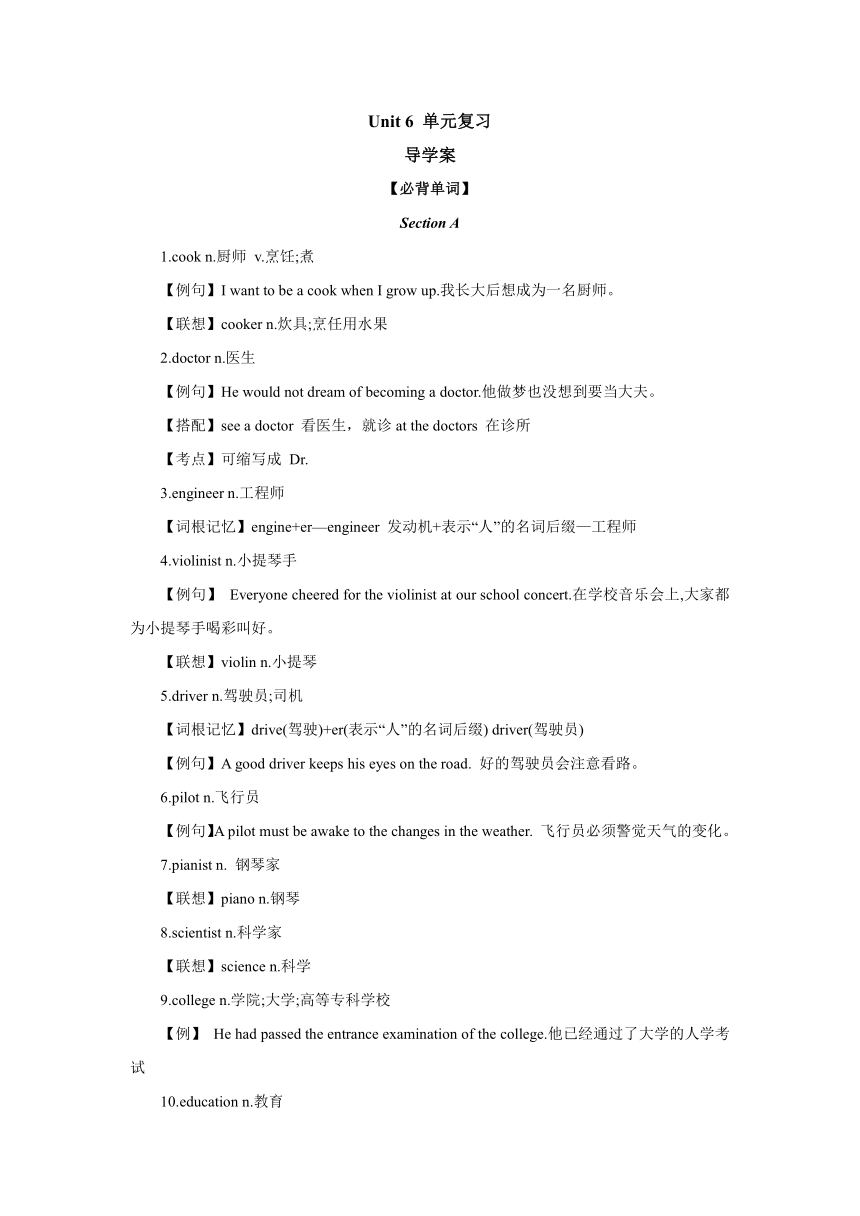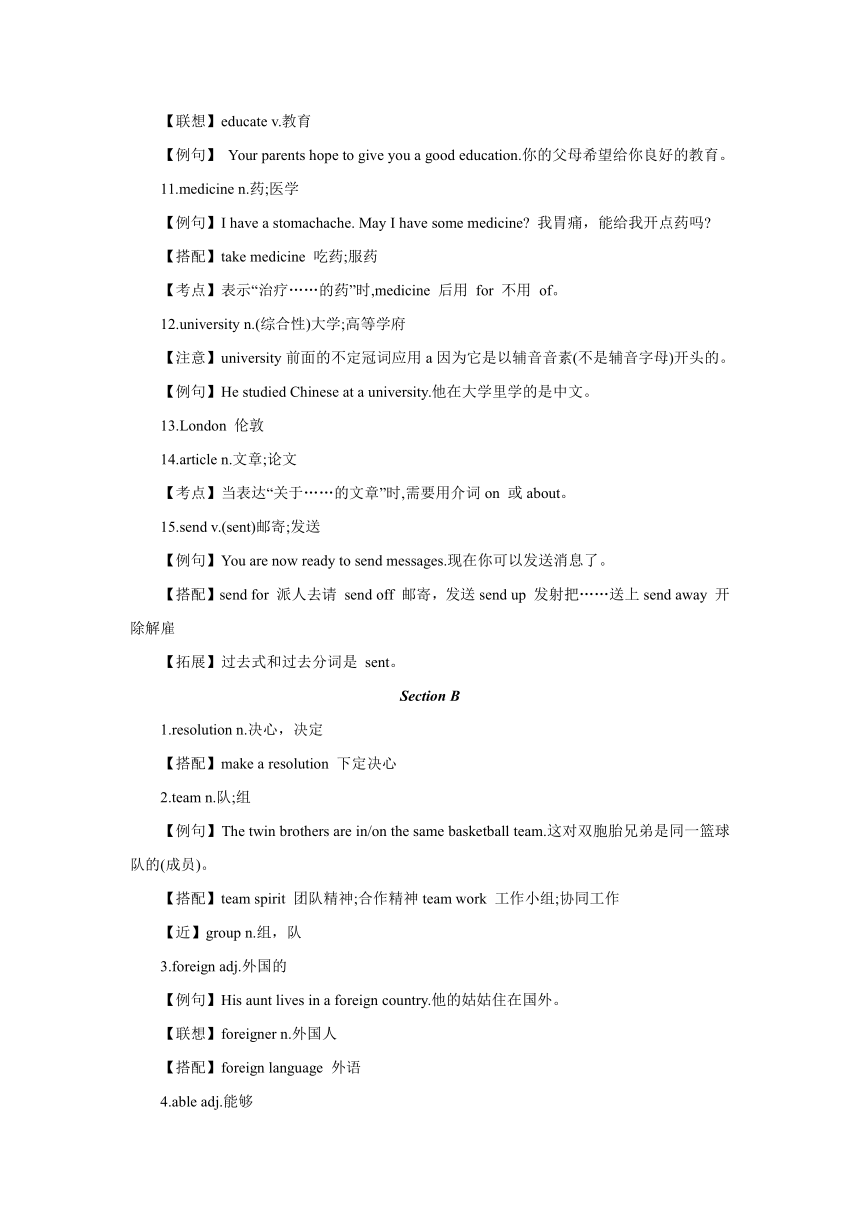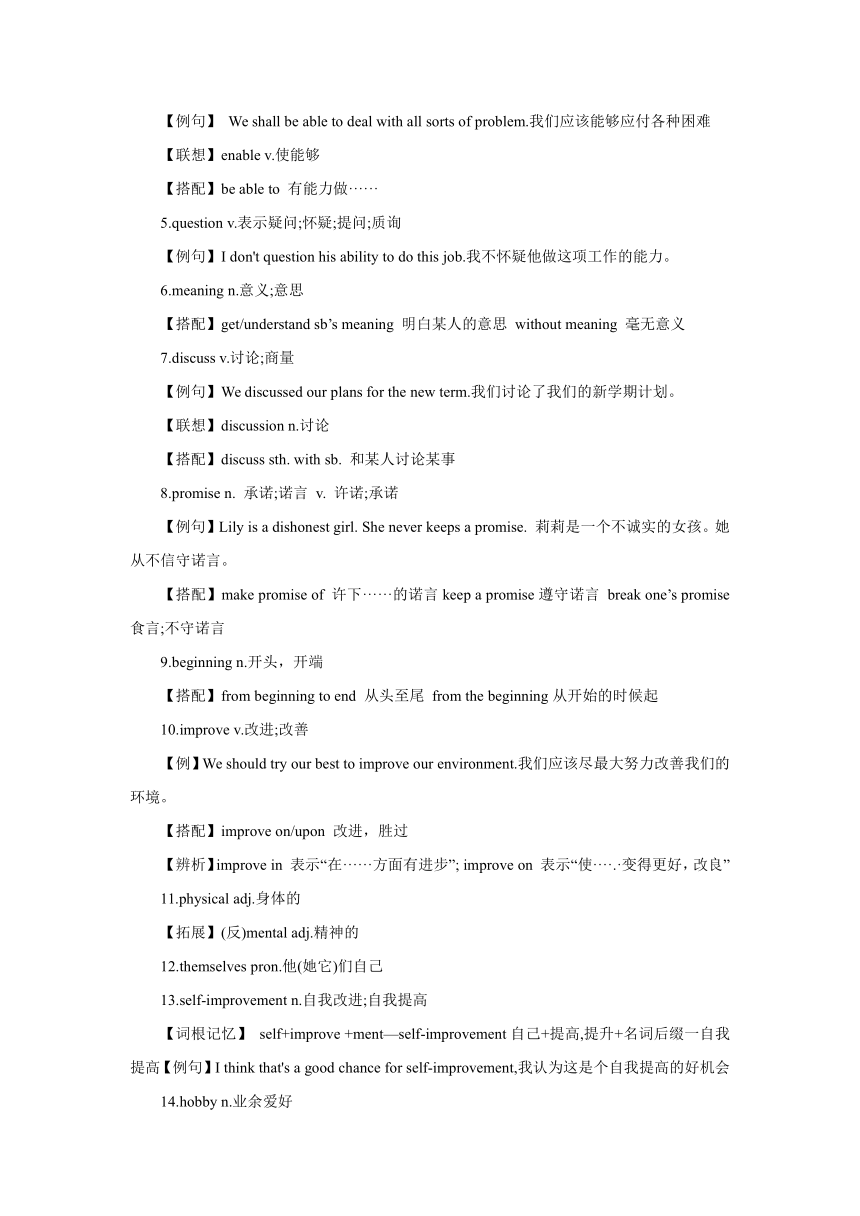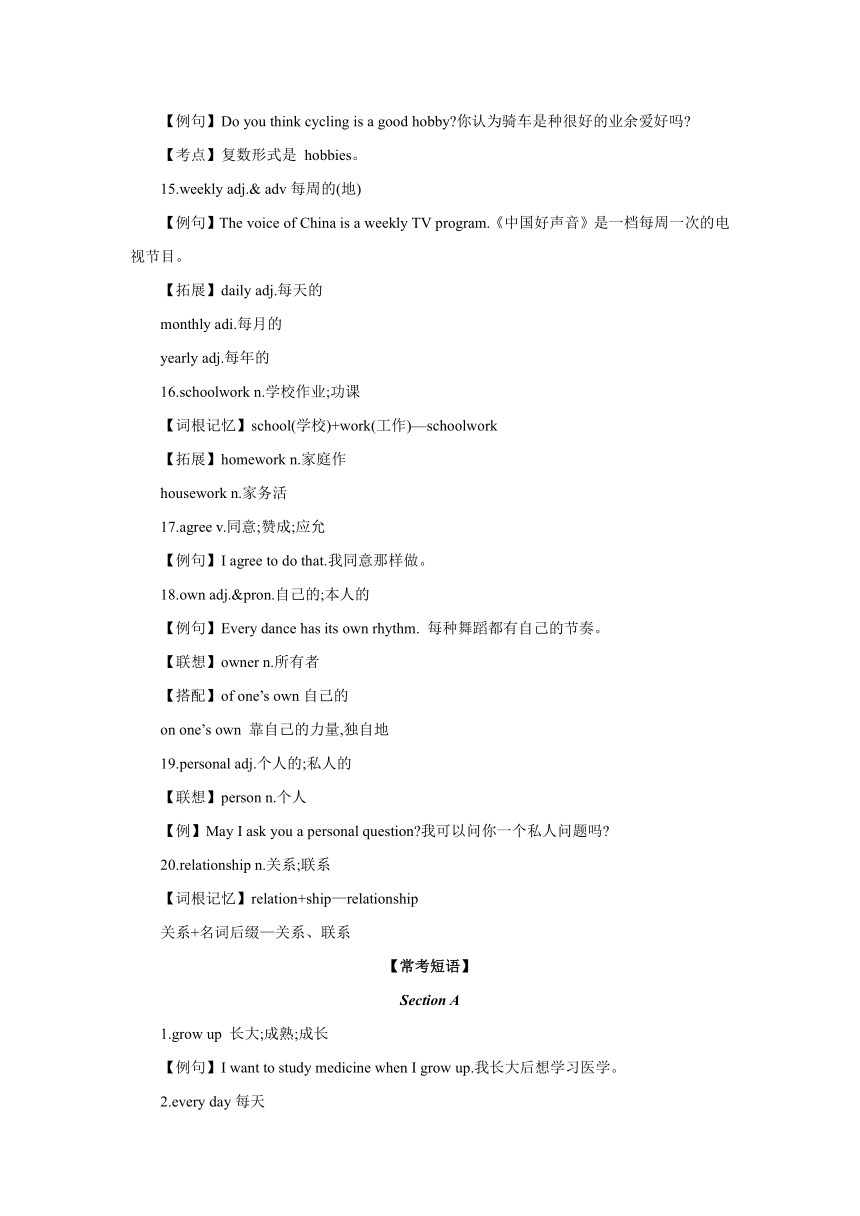人教版英语八年级上册Unit 6 I'm going to study computer science. 单元复习 导学案
文档属性
| 名称 | 人教版英语八年级上册Unit 6 I'm going to study computer science. 单元复习 导学案 |  | |
| 格式 | docx | ||
| 文件大小 | 21.6KB | ||
| 资源类型 | 教案 | ||
| 版本资源 | 人教新目标(Go for it)版 | ||
| 科目 | 英语 | ||
| 更新时间 | 2022-12-07 15:53:08 | ||
图片预览




文档简介
Unit 6 单元复习
导学案
【必背单词】
Section A
1.cook n.厨师 v.烹饪;煮
【例句】I want to be a cook when I grow up.我长大后想成为一名厨师。
【联想】cooker n.炊具;烹任用水果
2.doctor n.医生
【例句】He would not dream of becoming a doctor.他做梦也没想到要当大夫。
【搭配】see a doctor 看医生,就诊at the doctors 在诊所
【考点】可缩写成 Dr.
3.engineer n.工程师
【词根记忆】engine+er—engineer 发动机+表示“人”的名词后缀—工程师
4.violinist n.小提琴手
【例句】 Everyone cheered for the violinist at our school concert.在学校音乐会上,大家都为小提琴手喝彩叫好。
【联想】violin n.小提琴
5.driver n.驾驶员;司机
【词根记忆】drive(驾驶)+er(表示“人”的名词后缀) driver(驾驶员)
【例句】A good driver keeps his eyes on the road. 好的驾驶员会注意看路。
6.pilot n.飞行员
【例句】A pilot must be awake to the changes in the weather. 飞行员必须警觉天气的变化。
7.pianist n. 钢琴家
【联想】piano n.钢琴
8.scientist n.科学家
【联想】science n.科学
9.college n.学院;大学;高等专科学校
【例】 He had passed the entrance examination of the college.他已经通过了大学的人学考试
10.education n.教育
【联想】educate v.教育
【例句】 Your parents hope to give you a good education.你的父母希望给你良好的教育。
11.medicine n.药;医学
【例句】I have a stomachache. May I have some medicine 我胃痛,能给我开点药吗
【搭配】take medicine 吃药;服药
【考点】表示“治疗……的药”时,medicine 后用 for 不用 of。
12.university n.(综合性)大学;高等学府
【注意】university前面的不定冠词应用a因为它是以辅音音素(不是辅音字母)开头的。
【例句】He studied Chinese at a university.他在大学里学的是中文。
13.London 伦敦
14.article n.文章;论文
【考点】当表达“关于……的文章”时,需要用介词on 或about。
15.send v.(sent)邮寄;发送
【例句】You are now ready to send messages.现在你可以发送消息了。
【搭配】send for 派人去请 send off 邮寄,发送send up 发射把……送上send away 开除解雇
【拓展】过去式和过去分词是 sent。
Section B
1.resolution n.决心,决定
【搭配】make a resolution 下定决心
2.team n.队;组
【例句】The twin brothers are in/on the same basketball team.这对双胞胎兄弟是同一篮球队的(成员)。
【搭配】team spirit 团队精神;合作精神team work 工作小组;协同工作
【近】group n.组,队
3.foreign adj.外国的
【例句】His aunt lives in a foreign country.他的姑姑住在国外。
【联想】foreigner n.外国人
【搭配】foreign language 外语
4.able adj.能够
【例句】 We shall be able to deal with all sorts of problem.我们应该能够应付各种困难
【联想】enable v.使能够
【搭配】be able to 有能力做······
5.question v.表示疑问;怀疑;提问;质询
【例句】I don't question his ability to do this job.我不怀疑他做这项工作的能力。
6.meaning n.意义;意思
【搭配】get/understand sb’s meaning 明白某人的意思 without meaning 毫无意义
7.discuss v.讨论;商量
【例句】We discussed our plans for the new term.我们讨论了我们的新学期计划。
【联想】discussion n.讨论
【搭配】discuss sth. with sb. 和某人讨论某事
8.promise n. 承诺;诺言 v. 许诺;承诺
【例句】Lily is a dishonest girl. She never keeps a promise. 莉莉是一个不诚实的女孩。她从不信守诺言。
【搭配】make promise of 许下······的诺言keep a promise遵守诺言 break one’s promise 食言;不守诺言
9.beginning n.开头,开端
【搭配】from beginning to end 从头至尾 from the beginning从开始的时候起
10.improve v.改进;改善
【例】We should try our best to improve our environment.我们应该尽最大努力改善我们的环境。
【搭配】improve on/upon 改进,胜过
【辨析】improve in 表示“在······方面有进步”; improve on 表示“使····.·变得更好,改良”
11.physical adj.身体的
【拓展】(反)mental adj.精神的
12.themselves pron.他(她它)们自己
13.self-improvement n.自我改进;自我提高
【词根记忆】 self+improve +ment—self-improvement自己+提高,提升+名词后缀一自我提高【例句】I think that's a good chance for self-improvement,我认为这是个自我提高的好机会
14.hobby n.业余爱好
【例句】Do you think cycling is a good hobby 你认为骑车是种很好的业余爱好吗
【考点】复数形式是 hobbies。
15.weekly adj.& adv每周的(地)
【例句】The voice of China is a weekly TV program.《中国好声音》是一档每周一次的电视节目。
【拓展】daily adj.每天的
monthly adi.每月的
yearly adj.每年的
16.schoolwork n.学校作业;功课
【词根记忆】school(学校)+work(工作)—schoolwork
【拓展】homework n.家庭作
housework n.家务活
17.agree v.同意;赞成;应允
【例句】I agree to do that.我同意那样做。
18.own adj.&pron.自己的;本人的
【例句】Every dance has its own rhythm. 每种舞蹈都有自己的节奏。
【联想】owner n.所有者
【搭配】of one’s own自己的
on one’s own 靠自己的力量,独自地
19.personal adj.个人的;私人的
【联想】person n.个人
【例】May I ask you a personal question 我可以问你一个私人问题吗
20.relationship n.关系;联系
【词根记忆】relation+ship—relationship
关系+名词后缀—关系、联系
【常考短语】
Section A
1.grow up 长大;成熟;成长
【例句】I want to study medicine when I grow up.我长大后想学习医学。
2.every day每天
3.be sure about 确信;对······有把握
【例句】 You must be sure about the way to the village.你必须对去乡村的路有把握。
4.make sure 确保;查明
【例句】 Make sure ( that) you pick us up at five o’clock.你一定要在 5点钟来接我们。
5.send...to...把……寄/发送到……
【例句】Please send this letter to your uncle. 请把这封信寄给你叔叔。
6.want to be... 想成为……
【例句】I want to be a designer when I grow up.
Section B
1.the meaning of ...……的意思
2.be able to能够做某事
【例句】I was able to speak English when I was two years old.我两岁时就会说英语。
3.in common共同;共有
4.at the beginning of 在······开始
【例句】 At the beginning of this term, I found it hard to learn math. 这学期初,我发现学习数学很。
5.write down 写下;记录下
【例句】Please write down these new words.请把这此生词记下来。
6.have to do with关于;与······有关系
【例句】Miss Sun has to do with this matter.孙小姐与此事有关系。
7.takeup(尤指为消遣)学着做;开始做
【例句】When did you take up music 你什么时候对音乐感兴趣的
8.make a weekly plan 制定每周的计划
9.make the soccer team 成为足球队的一员
10.make promises 许下诺言/承诺
【例句】Tom often makes promises to his parents. 汤姆经常向父母许诺
11.learn to play the piano 学习弹钢琴
12. get lots of exercise 多锻炼
13.too...to...太……而不能
14.study hard 刻苦学习
15.make resolutions 下决心;制定计划
16.make a plan for...为······制定计划
17 the coming year 来年
18.for example 例如
【重点句型】
Section A
1. I'm going to study computer science.我打算学习计算机科学。
be going to 结构是一般将来时的一种形式。be going to 后接动原形,be 随主语的人称和数的变化而变化。be going to 句型的用法如下:
(1)表示主语的意图,即主语计划或打算要做的事。
【例句】We are going to visit the zoo next week.下周我们打算去参观动物园。
What are you going to do when you grow up 你长大后打算干什么
(2)表示主语根据目前迹象所做出的预测。
【例句】There are so many black clouds in the sky. I think it's going to rain soon.天空中乌云密布,我想很快要下雨了。
(3)与将来时连用的时间状语。
将来时表示的是未发生的动作,因此常与一些表示将来时间的状语连用。
tomorrow明天
tomorrow morning(afternoon, evening)明天上午(下午,晚上)
next week(year, month...)下周(明年,下个月......)
in a week(two days,five years...)一周(两天,五年+....·)后
soon 不久
有时还与 when,after,before,until等引导的时间状语从句连用。
【例句】They are going to visit America in a week.周后他们将去访问美国。
What are you going to do when you finish your work 你完成工作后打算干什么
(4)一般将来时的肯定、否定和疑问结构:
这种时态的助动词是 be,be 随主语的人称和数的变化而变化。构成疑问、否定时用 be。下面以动词 work为例说明。
肯定句 否定句 疑问句
I am going to work. We(You, They) are going to work. He(She, It) is going to work. I am not going to work. We(You, They) are not going to work. He(She, It) is not going to work. Am I going to work Are we(you, they)going to work Is he(she, it) going to work
Section B
1. This helps them to remember their resolutions.这会帮助他们记住他们的决定。help sb.to do sth.意为“帮助某人做某事”,to 也可省略。
【例句】Can you help me (to) prepare for the party 你能帮我为聚会做准备吗
【拓展】①help sb. with sth. 意为“在某方面帮助某人”
【例句】Mr. Zhang often helps me with my English.张老师经常在英语方面帮助我。
② help oneself to sth. 意为“随便吃·····.
【例句】Help yourselves to some fish,children! 孩子们,随便吃些鱼!
【语法总结】
一般将来时 be going to的用法
1.“be going to+动词原形”是一般将来时的一种表达形式,表示将要发生的动作或情况,be 随主语的人称和数的变化而变化。(1)肯定句:“主语+be(am/is/are)+ going+to+动词原形+其他”如:I'm going to ski tomorrow. 明天我要去滑雪。
(2)否定句:“主语+be(am/is/are)+not+going+to+动词原形+其他.”
如:I'm not going to see my friends this weekend.周末我不打算去看我的朋友。
(3)一般疑问句:“Be(Am/Is/Arc)十主语+going +to+动词原形+其他 ”如Is he going to play basketball 他打算打篮球吗
2.表示将要发生或打算、计划和决定要做的事情。
如:Tom and Susan are going to get married next month.汤姆和苏珊打算下个月结婚。
3.表示主语根据当前的情况做出的预测,通常是有迹象表明某事即将要发生,表达说话人较肯定的判断,指即将发生或肯定要发生的事,常用在“I’m sure. I’m afraid或I think”等后面。如: Look at the dark clouds! I'm afraid it's going to rain! 看那些乌云!恐怕马上就要下雨了!
4.be going to 表达的是未发生的动作,因此常与一些表示将来时间的状语连用。
例如:tomorrow, this evening, next month, in four weeks 等。有时也可与when, before, after, until 等引导的时间状语从句连用。
如:What is she going to do after she plays volleyball 她打完排球以后打算做什么
want to be 结构符合“want to”后面加动词原形的原则,be为am, is, are的原形,后接名词、形容词等。如:
He wants to be a pilot when he grows up.他长大后想成为一名飞行员。
助记:be going to用法:
be going to 表打算,准备、计划将来做表可能,有必然,通过现象来推断。使用它,要记住,疑问形式 be 提前否定句,很简单,not 放在 be 后边to 之后,动原形,be 的形式看人称
1. I _______at home and sleep all day tomorrow.
A. stay B. to stay C. am going to stay D. stays
2.—Let's discuss the plan, shall we
—Not now. I ____________ to an interview.
A. go B. went C. am going D. was going
3. There ________a party in my house this evening.
A. will have B. is going to be C. is going have D. is having
导学案
【必背单词】
Section A
1.cook n.厨师 v.烹饪;煮
【例句】I want to be a cook when I grow up.我长大后想成为一名厨师。
【联想】cooker n.炊具;烹任用水果
2.doctor n.医生
【例句】He would not dream of becoming a doctor.他做梦也没想到要当大夫。
【搭配】see a doctor 看医生,就诊at the doctors 在诊所
【考点】可缩写成 Dr.
3.engineer n.工程师
【词根记忆】engine+er—engineer 发动机+表示“人”的名词后缀—工程师
4.violinist n.小提琴手
【例句】 Everyone cheered for the violinist at our school concert.在学校音乐会上,大家都为小提琴手喝彩叫好。
【联想】violin n.小提琴
5.driver n.驾驶员;司机
【词根记忆】drive(驾驶)+er(表示“人”的名词后缀) driver(驾驶员)
【例句】A good driver keeps his eyes on the road. 好的驾驶员会注意看路。
6.pilot n.飞行员
【例句】A pilot must be awake to the changes in the weather. 飞行员必须警觉天气的变化。
7.pianist n. 钢琴家
【联想】piano n.钢琴
8.scientist n.科学家
【联想】science n.科学
9.college n.学院;大学;高等专科学校
【例】 He had passed the entrance examination of the college.他已经通过了大学的人学考试
10.education n.教育
【联想】educate v.教育
【例句】 Your parents hope to give you a good education.你的父母希望给你良好的教育。
11.medicine n.药;医学
【例句】I have a stomachache. May I have some medicine 我胃痛,能给我开点药吗
【搭配】take medicine 吃药;服药
【考点】表示“治疗……的药”时,medicine 后用 for 不用 of。
12.university n.(综合性)大学;高等学府
【注意】university前面的不定冠词应用a因为它是以辅音音素(不是辅音字母)开头的。
【例句】He studied Chinese at a university.他在大学里学的是中文。
13.London 伦敦
14.article n.文章;论文
【考点】当表达“关于……的文章”时,需要用介词on 或about。
15.send v.(sent)邮寄;发送
【例句】You are now ready to send messages.现在你可以发送消息了。
【搭配】send for 派人去请 send off 邮寄,发送send up 发射把……送上send away 开除解雇
【拓展】过去式和过去分词是 sent。
Section B
1.resolution n.决心,决定
【搭配】make a resolution 下定决心
2.team n.队;组
【例句】The twin brothers are in/on the same basketball team.这对双胞胎兄弟是同一篮球队的(成员)。
【搭配】team spirit 团队精神;合作精神team work 工作小组;协同工作
【近】group n.组,队
3.foreign adj.外国的
【例句】His aunt lives in a foreign country.他的姑姑住在国外。
【联想】foreigner n.外国人
【搭配】foreign language 外语
4.able adj.能够
【例句】 We shall be able to deal with all sorts of problem.我们应该能够应付各种困难
【联想】enable v.使能够
【搭配】be able to 有能力做······
5.question v.表示疑问;怀疑;提问;质询
【例句】I don't question his ability to do this job.我不怀疑他做这项工作的能力。
6.meaning n.意义;意思
【搭配】get/understand sb’s meaning 明白某人的意思 without meaning 毫无意义
7.discuss v.讨论;商量
【例句】We discussed our plans for the new term.我们讨论了我们的新学期计划。
【联想】discussion n.讨论
【搭配】discuss sth. with sb. 和某人讨论某事
8.promise n. 承诺;诺言 v. 许诺;承诺
【例句】Lily is a dishonest girl. She never keeps a promise. 莉莉是一个不诚实的女孩。她从不信守诺言。
【搭配】make promise of 许下······的诺言keep a promise遵守诺言 break one’s promise 食言;不守诺言
9.beginning n.开头,开端
【搭配】from beginning to end 从头至尾 from the beginning从开始的时候起
10.improve v.改进;改善
【例】We should try our best to improve our environment.我们应该尽最大努力改善我们的环境。
【搭配】improve on/upon 改进,胜过
【辨析】improve in 表示“在······方面有进步”; improve on 表示“使····.·变得更好,改良”
11.physical adj.身体的
【拓展】(反)mental adj.精神的
12.themselves pron.他(她它)们自己
13.self-improvement n.自我改进;自我提高
【词根记忆】 self+improve +ment—self-improvement自己+提高,提升+名词后缀一自我提高【例句】I think that's a good chance for self-improvement,我认为这是个自我提高的好机会
14.hobby n.业余爱好
【例句】Do you think cycling is a good hobby 你认为骑车是种很好的业余爱好吗
【考点】复数形式是 hobbies。
15.weekly adj.& adv每周的(地)
【例句】The voice of China is a weekly TV program.《中国好声音》是一档每周一次的电视节目。
【拓展】daily adj.每天的
monthly adi.每月的
yearly adj.每年的
16.schoolwork n.学校作业;功课
【词根记忆】school(学校)+work(工作)—schoolwork
【拓展】homework n.家庭作
housework n.家务活
17.agree v.同意;赞成;应允
【例句】I agree to do that.我同意那样做。
18.own adj.&pron.自己的;本人的
【例句】Every dance has its own rhythm. 每种舞蹈都有自己的节奏。
【联想】owner n.所有者
【搭配】of one’s own自己的
on one’s own 靠自己的力量,独自地
19.personal adj.个人的;私人的
【联想】person n.个人
【例】May I ask you a personal question 我可以问你一个私人问题吗
20.relationship n.关系;联系
【词根记忆】relation+ship—relationship
关系+名词后缀—关系、联系
【常考短语】
Section A
1.grow up 长大;成熟;成长
【例句】I want to study medicine when I grow up.我长大后想学习医学。
2.every day每天
3.be sure about 确信;对······有把握
【例句】 You must be sure about the way to the village.你必须对去乡村的路有把握。
4.make sure 确保;查明
【例句】 Make sure ( that) you pick us up at five o’clock.你一定要在 5点钟来接我们。
5.send...to...把……寄/发送到……
【例句】Please send this letter to your uncle. 请把这封信寄给你叔叔。
6.want to be... 想成为……
【例句】I want to be a designer when I grow up.
Section B
1.the meaning of ...……的意思
2.be able to能够做某事
【例句】I was able to speak English when I was two years old.我两岁时就会说英语。
3.in common共同;共有
4.at the beginning of 在······开始
【例句】 At the beginning of this term, I found it hard to learn math. 这学期初,我发现学习数学很。
5.write down 写下;记录下
【例句】Please write down these new words.请把这此生词记下来。
6.have to do with关于;与······有关系
【例句】Miss Sun has to do with this matter.孙小姐与此事有关系。
7.takeup(尤指为消遣)学着做;开始做
【例句】When did you take up music 你什么时候对音乐感兴趣的
8.make a weekly plan 制定每周的计划
9.make the soccer team 成为足球队的一员
10.make promises 许下诺言/承诺
【例句】Tom often makes promises to his parents. 汤姆经常向父母许诺
11.learn to play the piano 学习弹钢琴
12. get lots of exercise 多锻炼
13.too...to...太……而不能
14.study hard 刻苦学习
15.make resolutions 下决心;制定计划
16.make a plan for...为······制定计划
17 the coming year 来年
18.for example 例如
【重点句型】
Section A
1. I'm going to study computer science.我打算学习计算机科学。
be going to 结构是一般将来时的一种形式。be going to 后接动原形,be 随主语的人称和数的变化而变化。be going to 句型的用法如下:
(1)表示主语的意图,即主语计划或打算要做的事。
【例句】We are going to visit the zoo next week.下周我们打算去参观动物园。
What are you going to do when you grow up 你长大后打算干什么
(2)表示主语根据目前迹象所做出的预测。
【例句】There are so many black clouds in the sky. I think it's going to rain soon.天空中乌云密布,我想很快要下雨了。
(3)与将来时连用的时间状语。
将来时表示的是未发生的动作,因此常与一些表示将来时间的状语连用。
tomorrow明天
tomorrow morning(afternoon, evening)明天上午(下午,晚上)
next week(year, month...)下周(明年,下个月......)
in a week(two days,five years...)一周(两天,五年+....·)后
soon 不久
有时还与 when,after,before,until等引导的时间状语从句连用。
【例句】They are going to visit America in a week.周后他们将去访问美国。
What are you going to do when you finish your work 你完成工作后打算干什么
(4)一般将来时的肯定、否定和疑问结构:
这种时态的助动词是 be,be 随主语的人称和数的变化而变化。构成疑问、否定时用 be。下面以动词 work为例说明。
肯定句 否定句 疑问句
I am going to work. We(You, They) are going to work. He(She, It) is going to work. I am not going to work. We(You, They) are not going to work. He(She, It) is not going to work. Am I going to work Are we(you, they)going to work Is he(she, it) going to work
Section B
1. This helps them to remember their resolutions.这会帮助他们记住他们的决定。help sb.to do sth.意为“帮助某人做某事”,to 也可省略。
【例句】Can you help me (to) prepare for the party 你能帮我为聚会做准备吗
【拓展】①help sb. with sth. 意为“在某方面帮助某人”
【例句】Mr. Zhang often helps me with my English.张老师经常在英语方面帮助我。
② help oneself to sth. 意为“随便吃·····.
【例句】Help yourselves to some fish,children! 孩子们,随便吃些鱼!
【语法总结】
一般将来时 be going to的用法
1.“be going to+动词原形”是一般将来时的一种表达形式,表示将要发生的动作或情况,be 随主语的人称和数的变化而变化。(1)肯定句:“主语+be(am/is/are)+ going+to+动词原形+其他”如:I'm going to ski tomorrow. 明天我要去滑雪。
(2)否定句:“主语+be(am/is/are)+not+going+to+动词原形+其他.”
如:I'm not going to see my friends this weekend.周末我不打算去看我的朋友。
(3)一般疑问句:“Be(Am/Is/Arc)十主语+going +to+动词原形+其他 ”如Is he going to play basketball 他打算打篮球吗
2.表示将要发生或打算、计划和决定要做的事情。
如:Tom and Susan are going to get married next month.汤姆和苏珊打算下个月结婚。
3.表示主语根据当前的情况做出的预测,通常是有迹象表明某事即将要发生,表达说话人较肯定的判断,指即将发生或肯定要发生的事,常用在“I’m sure. I’m afraid或I think”等后面。如: Look at the dark clouds! I'm afraid it's going to rain! 看那些乌云!恐怕马上就要下雨了!
4.be going to 表达的是未发生的动作,因此常与一些表示将来时间的状语连用。
例如:tomorrow, this evening, next month, in four weeks 等。有时也可与when, before, after, until 等引导的时间状语从句连用。
如:What is she going to do after she plays volleyball 她打完排球以后打算做什么
want to be 结构符合“want to”后面加动词原形的原则,be为am, is, are的原形,后接名词、形容词等。如:
He wants to be a pilot when he grows up.他长大后想成为一名飞行员。
助记:be going to用法:
be going to 表打算,准备、计划将来做表可能,有必然,通过现象来推断。使用它,要记住,疑问形式 be 提前否定句,很简单,not 放在 be 后边to 之后,动原形,be 的形式看人称
1. I _______at home and sleep all day tomorrow.
A. stay B. to stay C. am going to stay D. stays
2.—Let's discuss the plan, shall we
—Not now. I ____________ to an interview.
A. go B. went C. am going D. was going
3. There ________a party in my house this evening.
A. will have B. is going to be C. is going have D. is having
同课章节目录
- Unit 1 Where did you go on vacation?
- Section A
- Section B
- Unit 2 How often do you exercise?
- Section A
- Section B
- Unit 3 I'm more outgoing than my sister.
- Section A
- Section B
- Unit 4 What's the best movie theater?
- Section A
- Section B
- Unit 5 Do you want to watch a game show?
- Section A
- Section B
- Unit 6 I'm going to study computer science.
- Section A
- Section B
- Unit 7 Will people have robots?
- Section A
- Section B
- Unit 8 How do you make a banana milk shake?
- Section A
- Section B
- Unit 9 Can you come to my party?
- Section A
- Section B
- Unit 10 If you go to the party, you'll have a grea
- Section A
- Section B
